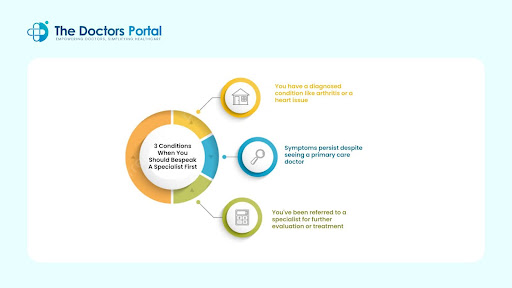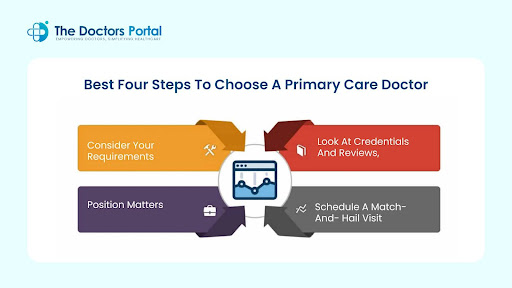When you’re not feeling your best, one of the first questions that often comes to mind is, “Should I make an appointment with a primary care provider or head straight to a specialist?” Choosing between the two can be confusing. Should you start with someone who knows your overall health, or go directly to an expert in a specific field? Understanding what is difference between primary care vs specialists can help you make an informed choice. Let’s break it down in simple terms so you can make the right decision the next time you’re scheduling an appointment.
What Is a Primary Care Provider?

A primary care provider( PCP) is like your main croaker — the bone you go to first for checks, complications, or ongoing health issues like high blood pressure. They take care of your whole health, not just one part. For illustration, if you’ve been feeling tired recently, your PCP will figure out what’s going on and only relate you to a specialist if it’s demanded. So if you’re asking, “ should I elect a primary care provider or a specialist? ” — start with a PCP. Wondering,” can a specialist also be a PCP?” Not really — specialists concentrate on just one area, while PCPs keep an eye on everything.
PCPs include;
- Family drug doctor
- Internists
- nanny interpreters
- Croaker sidekicks
What Do Specialists Do Else?
Specialists are doctors who concentrate on specific areas of medicine. If you have a particular issue—such as heart problems, digestive concerns, or skin conditions—they provide in-depth expertise and targeted treatments. Understanding what is difference between primary care vs specialists can help you choose the right provider based on your symptoms and needs.
examples of specialists;
- Cardiologists( heart)
- Dermatologists( skin)
- Gastroenterologists( digestive tract)
- Neurologists( nervous system)
They generally don’t offer general heartiness checks or manage overall health.
When to Choose a Primary Care Provider First?
You should bespeak an appointment with a PCP if;
- You’re passing general symptoms like fatigue, headaches, or digestive discomfort.
- You need an operation for ongoing conditions like asthma, hypertension, or diabetes.
- You’re seeking preventative care like wireworks, immunizations, or heartiness examinations.
- You want medical advice or alternate opinions before going further.
In numerous cases, starting with a PCP helps streamline your care, reduce charges, and lead to brisk results.
When to Book a Specialist First?

There are times when going directly to a specialist is more applicable
- You have a clear, specific health concern formerly diagnosed( e.g., rheumatoid arthritis or a heart condition).
- You are passing patient symptoms that have n’t gotten better despite visits to a PCP.
- You’ve been ascertained by your PCP to see a specialist for more advanced evaluation or treatment.
Still, if you are ever doubtful, err on the side of visiting your PCP first — they can guide you effectively.
Can a Specialist Also Be a PCP?
This is a great question “Can a specialist also be a PCP?”
While some specialists, like OB- GYNs, may offer limited primary care( especially for women’s health), they are n’t trained to handle the full range of health enterprises a true PCP manages.
In utmost cases, specialists are n’t equipped to
- Cover your long- term general health
- Manage unconnected habitual conditions
- give wide- ranging preventative care
So indeed if you regularly visit a specialist for a condition, you should still have a designated primary care provider.
How Do You Choose a Primary Care Doctor?

Still, then’s a simple companion
If you’re ready to choose a PCP but don’t know where to start. Check your insurance plan – Make sure the provider is in- network.
- Consider your requirements – Some PCPs have moxie in elders, women’s health, or habitual complaints.
- Look at credentials and reviews – Board instruments and patient witnesses matter.
- position matters – Convenience frequently leads to better appointment follow- through.
- Schedule a match- and- hail visit – This helps you assess communication and comfort.
Still, these tips will point you in the right direction. If you’re wondering how you choose a primary care croaker .
Conclusion:
When it comes to deciding between a primary care provider and a specialist, always remember what is difference between primary care vs specialists and start with your PCP—unless you have a clear reason not to. They offer comprehensive care, guide you when specialty input is needed, and ultimately help you manage your health efficiently and confidently.
👉 Looking for trusted PCPs and specialists near you? Explore top-rated providers on The Doctors Portal and take control of your healthcare today!
FAQs:
1. Do I need a referral from my PCP to see a specialist?
In numerous insurance plans, yes. Referrals help ensure you’re seeing the right specialist and your insurance will cover the visit.
2. What happens if I skip the PCP and go straight to a specialist?
You might end up in the wrong place, face advanced out- of- fund costs, or miss a broader opinion your PCP might have caught.
3. How frequently should I visit my PCP?
Annually for checks, and more constantly if you’re managing habitual health issues or new symptoms arise.
4. Can a nurse practitioner serve as my PCP?
Absolutely! numerous nanny interpreters offer excellent primary care and can diagnose, treat, and relate as demanded.
5. What’s the biggest benefit of seeing a PCP first?
They give substantiated care that looks at your overall health, not just one isolated issue which leads to better issues and smaller gratuitous procedures.

